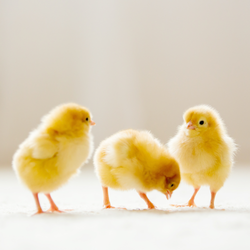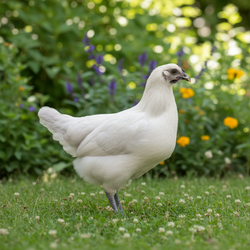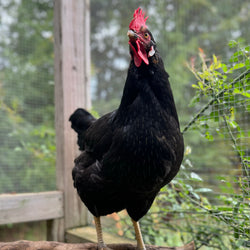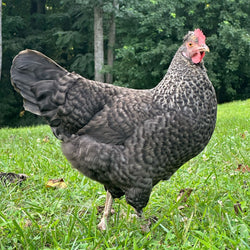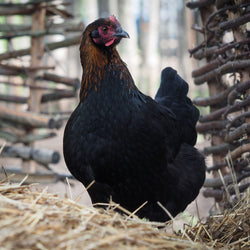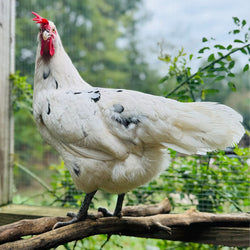page=3/--
Frequently Asked Questions
Here we answer the most commonly-asked questions about ordering, chicken care, and more.
Do chickens have a language?
In many ways they do. Chickens can make a very wide range of sounds, and they communicate amongst each other well. Roosters can sing loudly when they crow--they also issue predator warnings. Interestingly, they have different "words" for a predator that is coming on the ground, compared with a predator that is coming from above, like a hawk. They can call their girls over whenever they find a tasty treat by using a specific vocalization that the hens recognize. Hens make a similar clucky calling sound when they are teaching their babies what is good to eat and what is...
Read MoreWhat are the signs that a hen will start laying?
A hen who is ready to lay exhibits the following signs: Her comb will get larger and redder right before she begins laying. She will "squat" submissively when you reach down to pet her. She may get a little louder right before she begins laying, since she is experiencing new instincts, and she may not be sure exactly what they are telling her to do, yet. She may go in and out of nest boxes looking for a safe place to lay. She may try to drive the other hens away from possible nests if she is feeling protective. After...
Read MoreIf I order straight run birds, how many of each sex am I guaranteed to get?
Straight run birds are an "as hatched" mix of males and females. Therefore, if you were to order eight straight run birds, for example, you will get between zero and eight roosters and between zero and eight hens--there is no way to tell. Straight run chicks are sent "as hatched"--they are not sexed first and then separated out into each order. The reason is that expert sexers of day old chicks get top dollar since it is such a specialized skill--this is why ordering all straight run birds is less expensive than ordering all females. The only way to get...
Read MoreAt what age does a rooster begin crowing?
The age a rooster will first crow varies, but generally speaking, he will begin crowing at about four or five months of age, at about the time he begins to look like a mature rooster. It can certainly vary considerably, though. We've seen roosters hold off crowing until they're eight or nine months old, and we've seen them start as early as two months. (Talk about cute!) That said, if you have a crowing bird that is younger than three months old, don't be in a hurry to find a home for "him," however. Hens can crow, too, so you...
Read MoreCan I hold my rooster upside down by the feet to calm him down?
No. That's a terrible idea. Birds' respiratory systems are completely different ours, so holding your rooster upside down can cause him real problems. For example, a bird's lungs are right next to the spine and upper ribcage, so it is hard for a bird that is upside down to breathe, since the weight of all his organs will be pressing on his lungs and some of his air sacs. Normally, he will breathe via changes in pressure in the air sacs. So... when the pressure changes "unnaturally," it can make it difficult for him to compensate. Chicken's lungs can't expand...
Read MoreHow is sex determined in chickens and what does it mean?
|If you want to know how to tell the difference between males and females in chickens, please see our related questions, below. This question addresses how sex is determined in chickens genetically. In birds, the sex of the embryo is determined by the egg, not the sperm (as it is in humans). Avian sex differentiation is not determined by XY chromosomes like it is in humans and most mammals (or even the XO system used by some insects). In those systems the sex is determined by the sperm, by what the male contributes to the offspring. By contrast, birds have...
Read MoreHow can I incubate eggs that will hatch female chicks only?
The question of temperature-dependent sex determination (TSD) in chickens has been an important subject for scientific study over the last several decades. For most backyard chicken enthusiasts, females are preferred for egg laying and unwanted roosters often have to be rehomed. Wouldn't it be great if you could incubate and hatch all females, or at least hatch a much higher ratio of females than males? Sure! But as we shall see--don't get your hopes up just yet... An Australian study published in 1960 (Australian Journal of Agricultural Research 11(4) 664 - 672) found that eggs stored at 40 degrees Fahrenheit...
Read MoreHow do I get my flock to go into their coop at night so I can shut the door and make sure they're safe?
Once they have imprinted on their coop as "home," they will retire on their own at dusk. (Thus the saying: "Chickens always return home to roost.") You can get your birds to regard the coop as home by keeping them inside it for a few days after you have transferred them from the chick brooder. They will get used to sleeping there and will feel safe returning there at night. Naturally, you will want to make sure you don't keep them shut inside a hot coop in the dead heat of summer when they may get overheated--don't make the transfer...
Read More







"The Clubhouse" Coop
Easy to assemble and built to last, the Clubhouse Coop is the perfect starter coop for a small flock.

